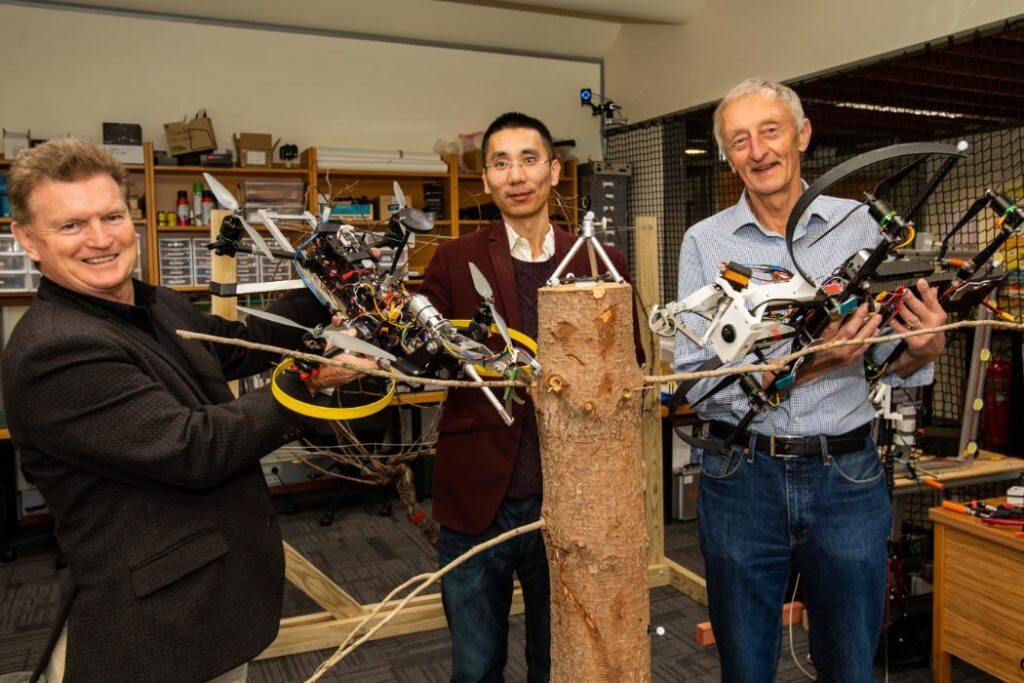Ten University of Canterbury research projects tackling the big issues have been green-lit with funding worth $23 million.


The Ministry of Business, Innovation and Employment (MBIE) Endeavour fund, announced by Research, Science and Innovation Minister Hon Dr Megan Woods, will fund University of Canterbury projects to improve food safety, increase drone capability, boost productivity of redox-flow batteries and reduce hatch failure in our critically endangered native bird, the Kākāpō.
Deputy Vice-Chancellor Research Professor Ian Wright is delighted with the high number of Canterbury research projects which gained funding.
“Our University of Canterbury researchers are committed to solving current and future challenges faced by all New Zealanders. The funding of these research projects highlights their national and international significance and relevance for ensuring tomorrow’s economy, industry, and environment are the best they can be.”
Professor Richard Green’s project, enabling unmanned aerial vehicles (UAVs or drones) to perform precise tasks in complex environments, will benefit from $9.8 million over 5 years.
“Our research will go beyond simple surveying and inspection tasks. We will build a platform for UAVs to use precision tools in changing dynamic environments, such as outdoors, around hazardous infrastructure like power pylons, or in construction or forestry, without ladders or scaffolding,” Professor Green says.
“Enabling UAVs to use precision tools is a new technological capability and a radical change in functionality. It will not only transform the way UAVs can be used, but also how and where,” he says.
Dr Bill Heffernan’s research is focused on a new electromagnetic detection and imaging method aimed at boosting food safety systems will benefit from $5.2 million in funding over 5 years. The technology, first developed for the timber industry, is being adapted to identify foreign objects in food, such as milk.
Associate Professor Tammy Steeves’ Smart Idea (receiving $1,000,000 over 3 years) is a nationwide project investigating the DNA structure of the Kākāpō to find the cause of high hatching failure. It is believed to be the first research project in the world investigating the relationship between DNA structure and early hatching failure.
UC research projects awarded 2021 Endeavour funding
Eight University of Canterbury Smart Ideas and two Research Programmes have been funded in the 2021 MBIE Endeavour Round:
Research Programmes
- Professor Richard Green – Enabling unmanned aerial vehicles (drones) to use tools in complex dynamic environments ($9,837,002 over 5 years). Enabling drones to use tools in complex environments
- Dr Bill Heffernan – A new electromagnetic imaging method for advanced food process optimization ($5,225,040 over 5 years). Super-sensing offers food safety breakthrough for food processing industry
Smart Ideas projects
- Associate Professor Catherine Bishop – Production of technology-critical, strategic metals using molten oxide electrolysis ($999,999 over 3 years). Unique research into tech-critical metals to help support climate goals
- Professor James Brasington – 3D bathymetric modelling of shallow freshwater bodies with short-wave, small-footprint aerial lidar ($999,924 over 2 years).
- Dr Sarah Kessans – Fungal biosynthesis of nisin for enteric methane mitigation ($1,000,000 over 2 years). Launching a space lab into orbit
- Associate Professor Aaron Marshall (Principal Investigator at The MacDiarmid Institute) – Designing electrocatalytic electrodes to increase performance and lower the cost of redox flow batteries ($1,000,000 over 3 years). UC electrode research paving the way for cheaper renewable energy storage
- Professor Tanja Mitrovic – Transforming New Zealand’s ICT workforce using digital personalized interactive training ($999,753 over 3 years). Targeted approach to developing soft skills in ICT sector
- Dr Stephen Pawson – Distributed radio-localisation techniques to track flying insects with a UAV swarm ($999,705 over 3 years). Tracking NZ’s threatened bugs with drones
- Associate Professor Tammy Steeves – Building an integrative genomics framework to mitigate maladaptive reproductive traits in endangered species ($1,000,000 over 3 years). Breakthrough for kākāpō hatching could be in the genes
- Professor Matt Watson – Non-invasive sap flow measurement and mechanisms for reliable tree syrup yield predictions ($999,999 over 3 years). Sweet future tapped for NZ maple syrup test



































